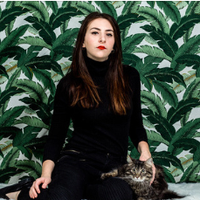Enter the Weird, Wonderful World of Jenny Slate
The co-creator of the beloved character Marcel the Shell With Shoes On has taken on many new roles of late: mother, wife, rom-com leading lady. With each step she becomes more herself.
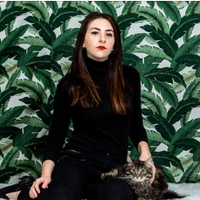
As soon as we’re past the ticket-taker at the gates of the Huntington Botanical Gardens in Pasadena, California, Jenny Slate tells me a story about ducks. “One time, I was at the zoo, and there was an enclosure, and I couldn't see what was in there, and then I realized it was for ducks. Out loud, I said, ‘Oh, it's just ducks.’” A natural response to seeing birds that inhabit your local park in a place for exciting and exotic animals. But Slate felt guilty for insulting the ducks out loud. “It's so shitty!”
Slate has just arrived in Los Angeles—just arrived, as in, that morning—from the seaside Massachusetts town where she lives with her husband, artist and writer Ben Shattuck, and their one-year-old daughter, Ida. Slate jokingly promises that she’s showered since she got off the plane. (No one has ever looked more put-together after a day of travel; Dyson Airwrap should feature her on billboards.)
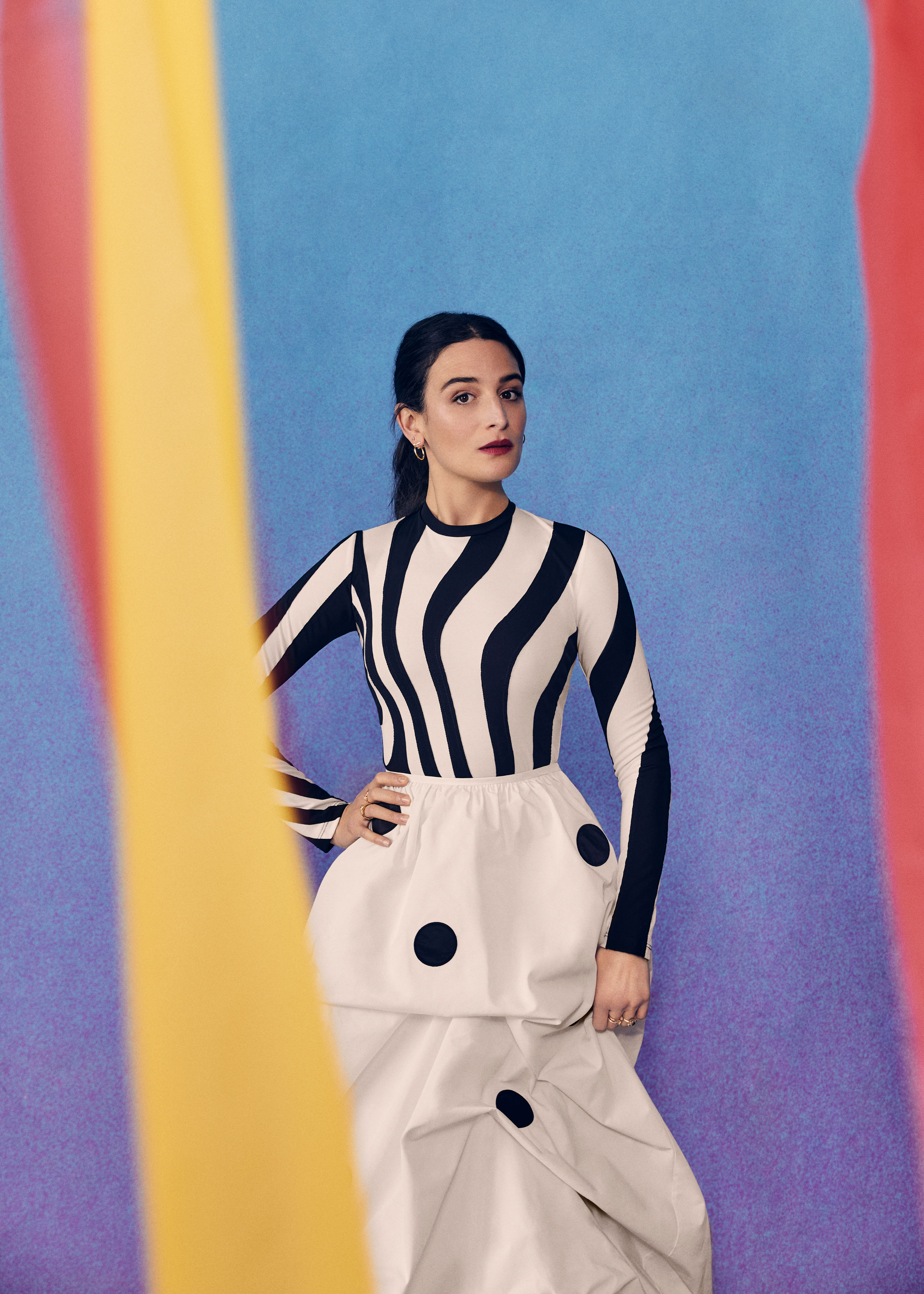
Tory Burch top and skirt, Tiffany & Co. earrings and rings
She is a small person, petite even in the heeled boots she wears. She speaks in metaphors and paragraphs, with sentences that burrow into your brain. The duck story is the type of story—unexpectedly funny, strangely sweet, somehow moving, a little weird—that perfectly encapsulates Slate’s comedic sensibility. A sensibility that has made her a household name and television mainstay over a decade of work on Saturday Night Live, Bob’s Burgers, and Parks and Recreation. (Slate says her brief but memorable guest spot on the NBC comedy as Mona-Lisa Saperstein is the role for which she remains most often recognized. It’s certainly her most meme-ed: You can’t go a day on Al Gore’s internet without seeing a gif of Mona-Lisa, hand-extended, saying, “Money please!” or a remixed image of her most famous quote, “I have done nothing wrong, ever, in my life.”)
In parallel to her mainstream television success, the 39-year-old has remained an indie darling. In 2014 she took a star turn in Gillian Robespierre’s sour-sweet abortion comedy, Obvious Child. Then there was her sprawling and critically acclaimed Netflix standup special, Stage Fright, in 2019 (The A.V. Club gave it a rare A rating), and a book of essays, Little Weirds, that same year. “After writing my book, I think I was like, You'll never be able to convince me that I'm not my own strange flame,” she says, “I am. …I just am. I like what I am. I think I get it. I enjoy what I'm like.”
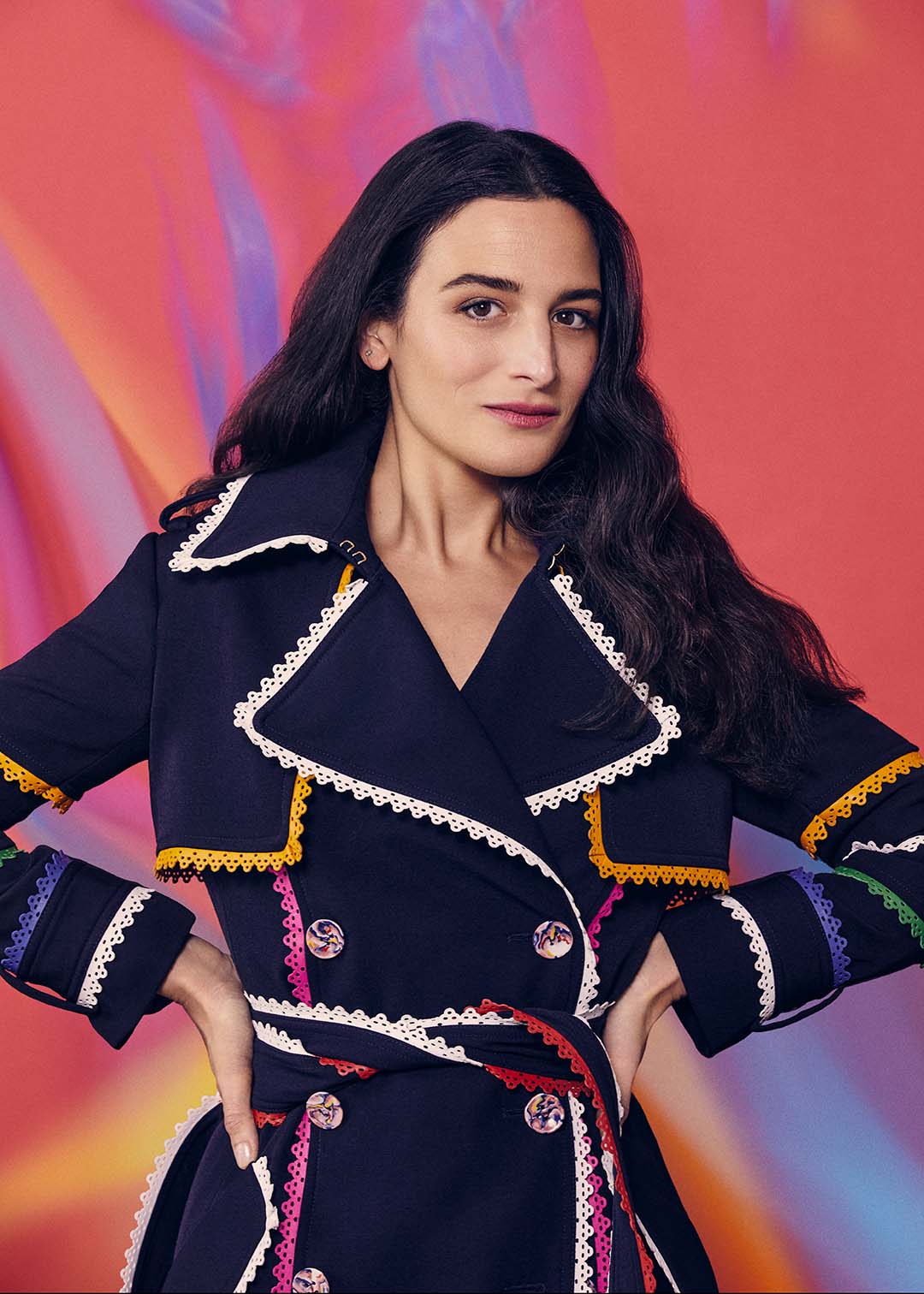
Chloé coat
Hollywood has a bad habit of forcing actresses to play the same type of role over and over again—the “if it ain’t broke” model of female stardom. But Slate’s career has been more eccentric: an idiosyncratic mix of characters and projects across a variety of mediums.
“I felt like no one knew what the fuck to do with me,” Slate says of the parts she’s been offered. “Maybe I'm not pushing for anything, but I'm not super interested in jumping up my agents' butts. It's so boring! That's so boring and humiliating.” She continues: “I think, sure, there's a way in which I could have probably had a really successful career doing maybe network sitcoms, and I didn't want to do that because I have a very short attention span. I don't like the idea of being under contract for a long time. I think even after being on SNL, and just returning to the same studio every day, I was like, ‘As an animal, I don't like this.’”
Perhaps Slate’s most endearing—and enduring—creative project has been the internet-beloved Marcel the Shell with Shoes On, which she developed in 2010 alongside her now-ex-husband filmmaker Dean Fleischer-Camp. In the original short film, Slate lends her distinctive voice to Marcel, a small googly-eyed mollusk with, well, shoes on, learning to navigate a world of small, achievable tasks but also an overarching sense of loneliness. The character is a mix of melancholy and optimism, of undeniable cuteness juxtaposed with aesthete philosophical insights. Marcel reappeared in two sequel shorts and two children’s books. Now, he’s coming to the big screen.
Get exclusive access to fashion and beauty trends, hot-off-the-press celebrity news, and more.
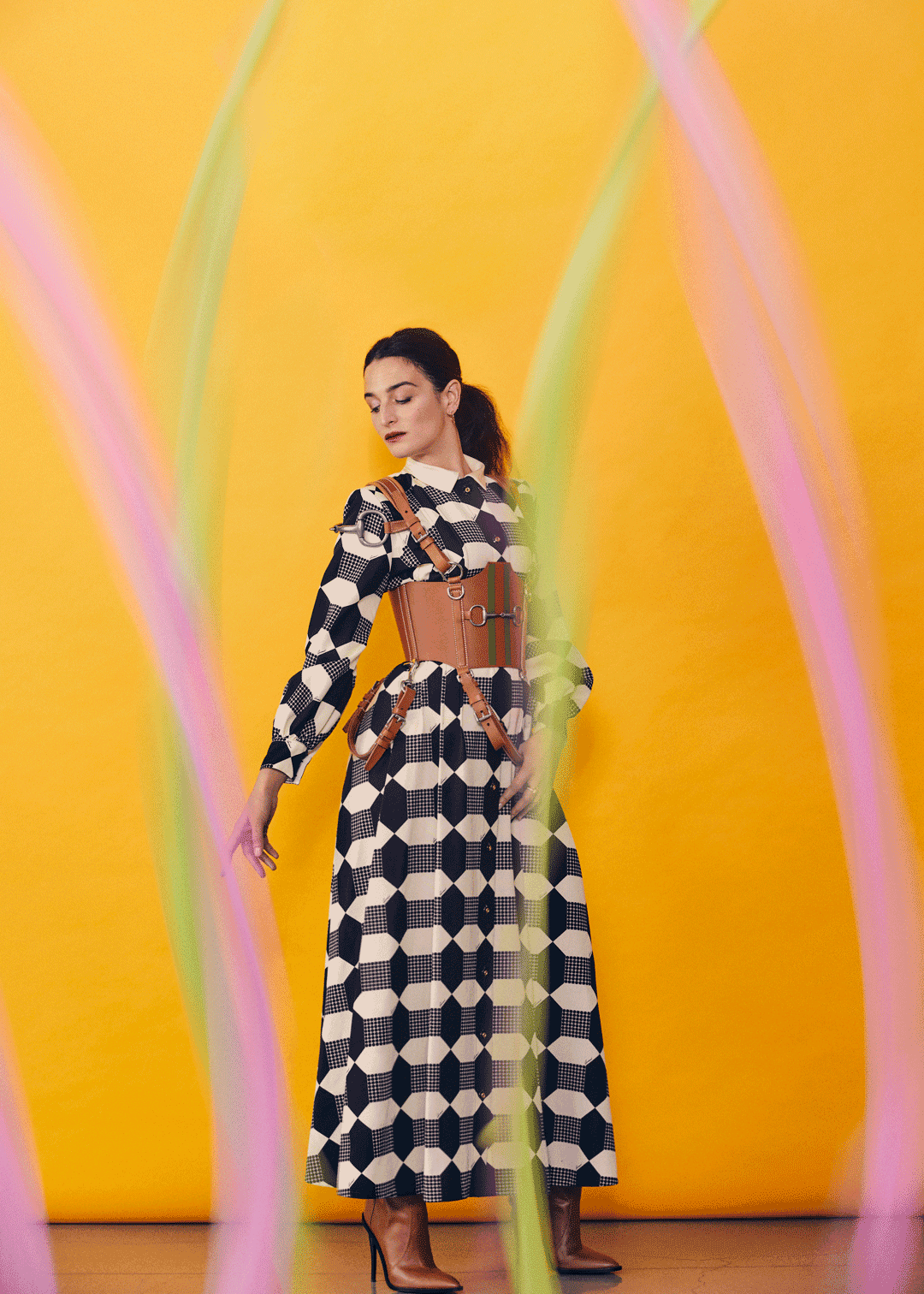
Gucci dress and harness, Tiffany & Co. earrings and rings, Sylth Virago boots
“I feel like I would describe Marcel as ... I was writing to a friend yesterday that [creating Marcel is] like I'm putting a hand down into the richest, darkest part of my psyche and trying to pull out the thing that I really want people to see about me, and what I'm like, and how I think, and what I need, and it comes out this way,” Slate reveals. “I really, really, really value it.”
She sees Marcel the Shell as a palliative to our media culture of high-octane rapid-fire content: “I just hope that it exists in people's lives as if something ... a glowing orb landed in your backyard in the middle of the night, and you just looked at it for a while. I think I guess I hope it allows people to feel that they are entitled to their own moments of contemplation.”
Almost as soon as Marcel the Shell went viral on YouTube, Hollywood studio executives with dollar-signs in their eyes began approaching Slate and Fleischer-Camp with their visions for how the minutes-long film could become the next hit mass-market franchise. “We were always pretty turned off by the ways that people figured that it should be changed,” Slate says. “It was always [pairing Marcel with] a guy: ‘He's best friends with this tall guy.’ It was just like… ‘This isn't ... Why would you do that?’"
Finally, they found financing that allowed them to retain full creative control. “I really like it,” Slate says, of the finished project. “It feels like ...,” she pauses. “Have you ever just— God, I'm so hungry for something, and you make it, and it's just what you want?”
I hope it allows people to feel that they are entitled to their own moments of contemplation.
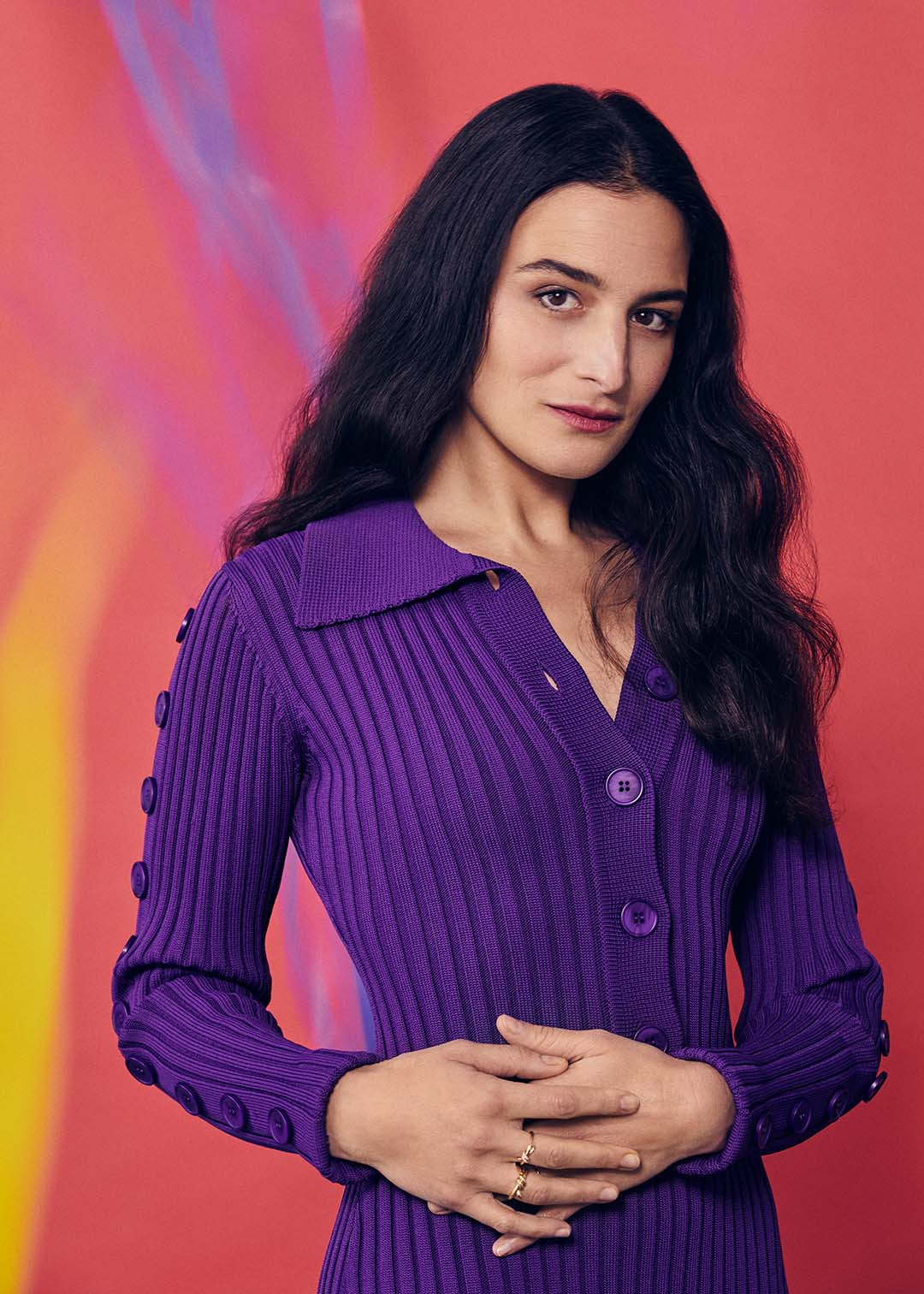
Above: Hanifa dress, Tiffany & Co. rings; Below: Versace Top
When Slate and Fleischer-Camp first made Marcel, they were collaborators and romantic partners. They divorced in 2016, but continued to work together creatively. “In some ways, there are challenges that come up when you're working with someone, and your relationship is…” Slate pauses, and thinks, “is making a big, big shift. But no… It certainly wasn't dramatic or fighting or something like that. This is both of our favorite piece of work, I think, that we do, and are doing, and have done. So, I think we just wanted to keep our eye on that. We never talked about it, but I feel like both of us understood the doing the work and doing it well.”
The process for making Marcel the Shell The Feature involved an outline rather than a full script. “It was a unique, beautiful, alive, iterative process,” says Elisabeth Holm, a producer on the film, who also worked with Slate in producing Obvious Child, Landline (a 2017 family dramedy set in the ‘90s), and Slate’s Netflix special. “It really speaks to who Jenny is as an artist and a performer.” Holm explained that filming the movie required first recording a full audio-play version of the story, then making an animatic (a storyboard with dialogue), and then shooting all of the live action sequences before overlaying in their stop-motion characters. “We made this movie multiple times over,” Holm explains. “And each time we added a beautiful new layer.”
The first layer required Slate doing a lot of improvisation. “It would just be like, ‘Okay. This is the scene where Nana Connie wants Marcel to do the interview, and he doesn't want to,’ and the gist is she's like, ‘You can't not do things because you're afraid,’ and Marcel has to say that he's afraid that things will just get worse and not get better, and he doesn't know if he can handle it. So, it's very, very set up. [From there,] we would have a natural conversation about it,” Slate recounts, keeping one eye on the placards that denote the genus and species of the plants lining the garden’s walkway. “There's one called ‘ketchup and mustard,’” Slate says as we enter the trellises, and sure enough, a few rows in, there it is: a bright yellow rose tinted with red at the tips of its petals. Ketchup and Mustard, its little sign says.
In order to develop a fully-formed emotional story, Slate estimates she recorded as many as 100 hours of audio as the shy shell living with his grandmother, Nana Connie (voiced by the iconic Isabella Rossellini), in an apartment that’s become an Airbnb. Like the original, it’s marmalade-sweet, yet anchored with an unmistakable melancholy—the sense of loneliness that comes from being very small in a very big world.
I ask Slate if she considers herself a lonely person, and she pauses for a moment. “I've been in a long process of trying to understand the difference between loneliness and solitude,” she says. “Part of that is not being afraid of being alone, and then getting past that fear, and then starting to separate out what is loneliness, and what is solitude, and what is privacy, and what is secret? What is a natural separation of time and schedule, and what is abandonment—or rejection? What is rejection and abandonment, and what is just people taking space to do their own day or whatever? So, no. Now I don't feel lonely at all. It feels like a big injury that healed.”
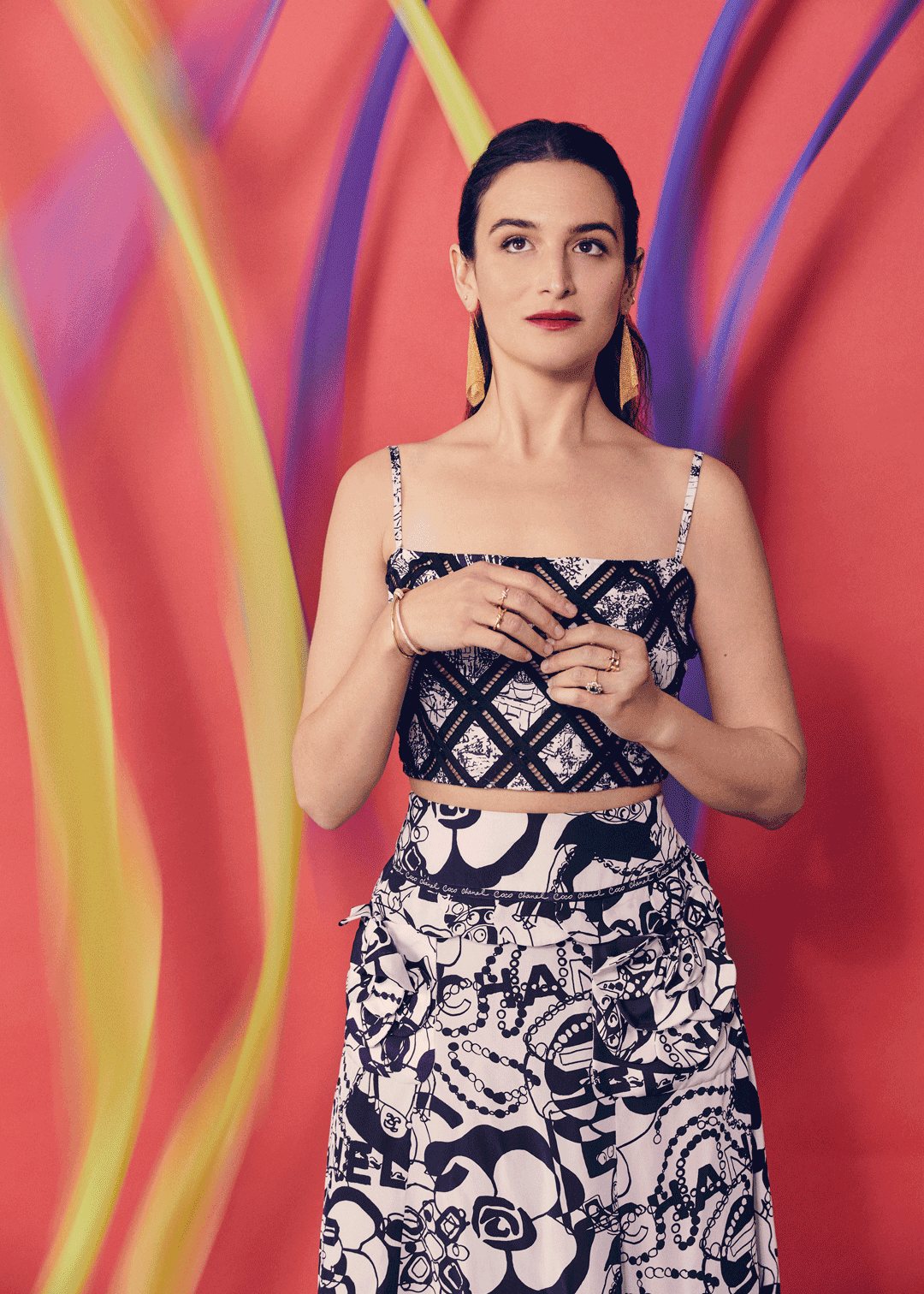
Chanel top and skirt, Tiffany & Co. jewelry
In the feature length film, we get the backstory on why Marcel lives such an isolated life, and, in a meta-twist, we also see the exhilaration and challenges that come after Marcel’s first internet video goes viral. That aspect of his story is echoed in Slate’s own life, as she deals with the question of how much of herself she wants to reveal online after a dozen years as a public-facing performer. “I think it's something that I felt a few years ago, that Instagram, things like the social media outlets, platforms, whatever, they want to say that they're a community and make themselves look and feel better by saying that, but [they’re] not. I guess they are, but whether or not they're a positive community is ... I don't even think that's debatable,” Slate says. “A few years ago, I just suddenly was like, ‘There is nothing for you here.’”
“I think she’s kind of an endless onion, and I think there’s so much more of her that has yet to be revealed,” says Holm. “Maybe now, in this period of her life... she might be becoming a bit more private in a way that is really healthy and cool. [She’s] keeping a part of herself for herself so that ultimately she can give even more on stage or in the next work. “
It’s possible Slate feels as though she has more to protect—marriage to a partner she loves, and their child together. Slate and Shattuck were married just two weeks ago on New Year’s Eve 2021 in their living room, their fourth attempt at a wedding after the first three were cancelled due to Covid. “We were planning on a [wedding] that ended up being almost 200 people, and then now, it’s just our parents and siblings. We each invited six friends… I actually like it. I like it better. I didn't realize how the large thing was making me feel uncomfortable, a little bit. Just a little.” She turns toward a flower bed with hundreds of small wrinkled purple blooms, rising up higher than it looks like their stems can support. “These are my favorite. I think they're scabiosa.”
“It just came in,” Slate says of her unexpected horticultural knowledge. “I guess [from] reading about it, and also ordering [flowers] for friends, and going into flower shops, and asking what things are. Asking.” We continue past the roses, weaving between the groups of people and families until we reach a bench in the sun in the Japanese Gardens. Slate apologizes for being boring. (She’s not.) “I used to just let everyone completely look up into my anus,” she says.
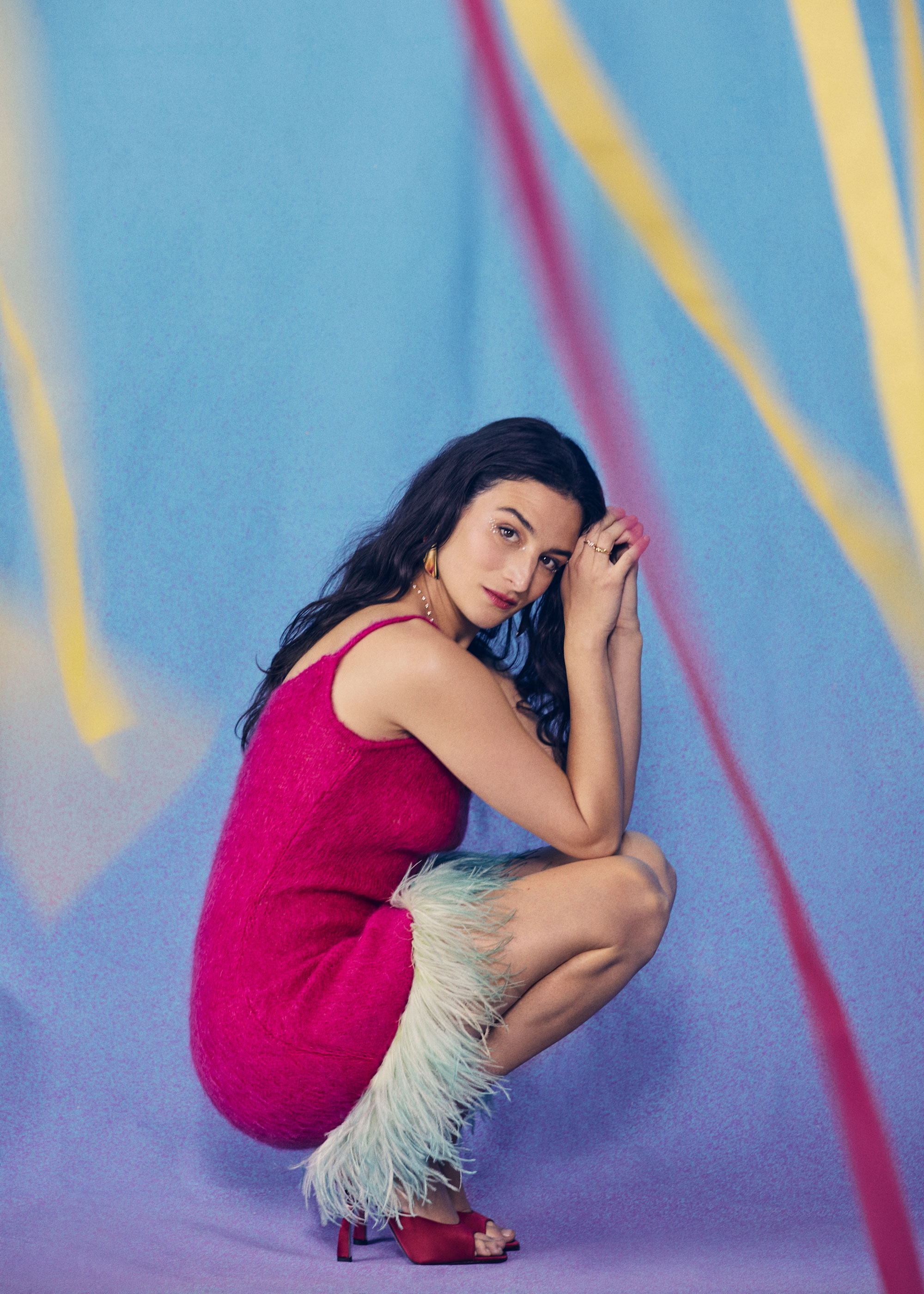
Saint Laurent by Anthony Vaccarello dress, Tiffany & Co. jewelry, Pīferi shoes
Though Slate may be more publicly closed off—an act of self-defense, against cheap publicity, against becoming a headline instead of a person—privately she’s never felt freer. “I only realized this after I had the baby, but I thought being a mother would be like a replica of my own mother's experience with motherhood,” says Slate, the middle of three daughters. “At least, how I perceived it: in which she really, really, really loves us so much, and also, she often seemed really stressed out, and at loose ends, and at her wits' end, and exhausted, and splattered in clay. Instead, I feel like it's been the opposite of that for me. Not at all that it's not difficult and challenging to have a newborn baby. There are so many profound challenges, but I've never been happier in my life. I feel like I can finally be what I want to be.”
Just 10 weeks after Slate gave birth ("It was seven hours before I got the epidural. Fucking gnarly," Slate says of delivering her daughter. "I am really proud that I did it."), she began filming the romantic-comedy I Want You Back, streaming on Amazon Prime Video on February 11. In it, she stars as the lovesick Emma who, heartbroken after getting dumped by her boyfriend (Scott Eastwood), allies with a similarly heartbroken work associate (Charlie Day) to win back their respective exes.
“I was a huge fan of Jenny Slate, always have been,” Day tells me over the phone. “I knew she would have no problem handling the comedy or the drama because I’ve seen Obvious Child. She’s so amazing in that movie… She’s hilarious, and innovative, and really smart and also a really passionate person. I really wish I could go into another movie with Jenny, and another. If we could do the Tom Hanks-Meg Ryan thing, I would be very happy.”
There are so many profound challenges, but I've never been happier in my life. I feel like I can finally be what I want to be.
“I was just wearing pants again for the first time!” Slate says of returning to set so soon after having a baby. “[The crew] were so sweet about just letting me completely take the lead. I had to pump every three hours. Sometimes I wouldn't make it to three hours. I never worked that way before. Making that film has definitely changed the way that I'll make all of my other work. I started to advocate for myself.” Slate says she felt empowered by advice given to her by co-star Gina Rodriguez, who plays Day’s ex-girlfriend, now besotted with an artsy acting teacher.
“Gina actually said this to me on set: The whole deal about making sure you can get what you want at work is to do it kindly and clearly, and not be sliding around in terms of who you hope to soothe or placate, but just be like, ‘This is what it needs to be for me,’” Slate recalls. “Now it just wouldn't be worth it to me to compromise.”
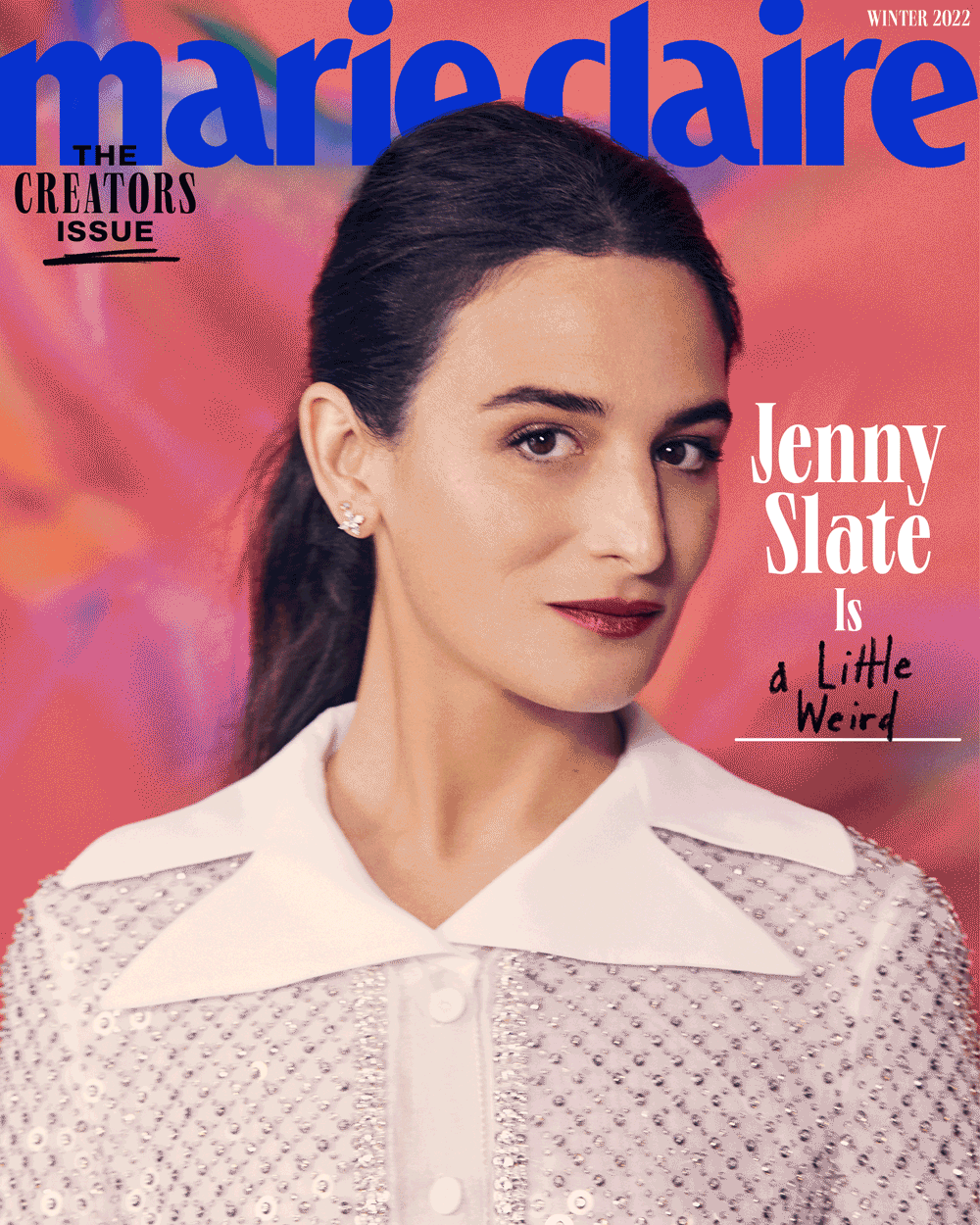
Miu Miu top, Tiffany & Co. earrings
As we’re lingering by the exit of the Huntington, I ask Slate if there’s a joke, or piece of writing, or work of art that she’s jealous of, something she wished she herself had created. “My God. I'm going to be thinking about this,” Slate says. “I’m going to have a better answer later. But you know what I really love? I really love Monk.”
“The TV show?” I ask. My brain floods with images of Tony Shalhoub, and I’m moments away from confessing that I spent most of my middle school years watching the USA procedural about the quirky detective. “No,” Slate says, “The artist.”
Ohhh. She means Munch. She means Edvard Munch, the Norwegian post-impressionist painter. Slate tells me about a transcendent experience she had at the Munch Museum in Oslo and I try to mask my embarrassment. One of Jenny Slate’s characters might be a fan of pretty good procedural cable TV, and heck, Jenny Slate the actress would make a great Monk in the inevitable gender-swapped reboot, but Jenny Slate the individual gravitates toward quieter, more personal art. Hollywood and the media have tried over and over again to figure out what box they can put Slate into. But Slate, rare bird that she is, cannot be enclosed.
Photographer/Director: Ramona Rosales | Creative Director: Tova Diamond | Style Director: Julia Gall | Stylist: Monty Jackson | Stylist Assistant: Jake Mitchell | Hair: Nikki Providence | Makeup: Kirin Bhatty | Manicurist: Emi Kudo | Tailor/Seamstress: Hasmik Kourinian | Director of Photography: Bryce Drobny | Producer: SJ Ashby, Kindly Productions | On-set producer: Ryan Holt | Prop Stylist: Natalie Shriver | Prop Stylist Assistant: Maggie Barr | Digital Tech: Michael Gulde | First Assistant Cameraman: Chris McElroy | Dolly/Rigging Grip: Hunter Zieske | Lighting Assistants: Daniel Calderón, Simon McDermott-Johnson | Retoucher: Strix Digital | Post Production/VFX: Bespoke Digital | Location: Hubble Studios
Letter From the Editor
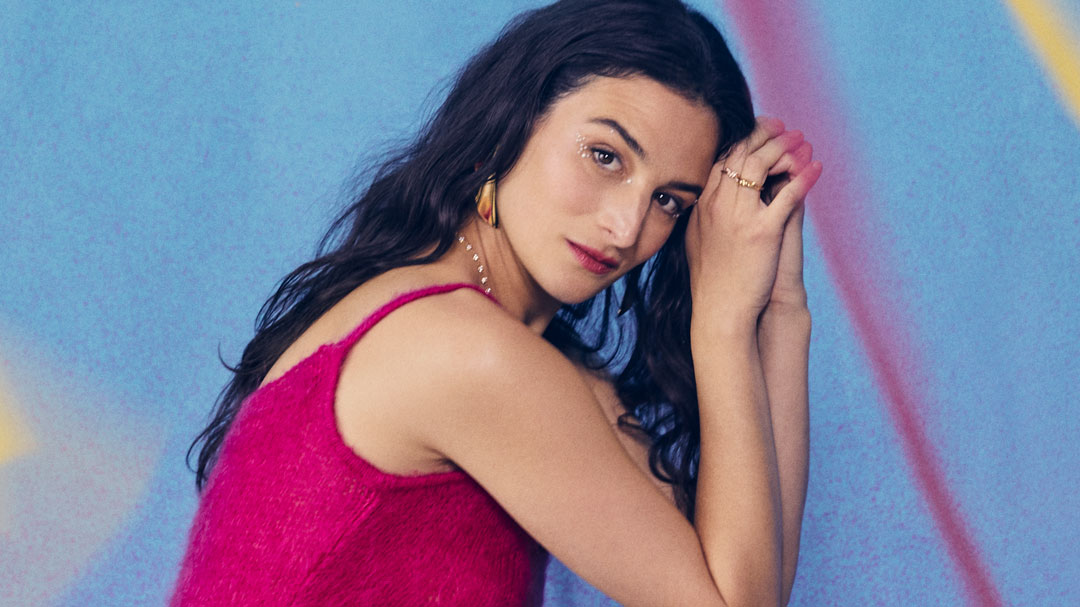
Dana Schwartz is the author of three books and the host and creator of the history podcast NOBLE BLOOD. As a journalist, she’s written for Entertainment Weekly, GQ, Vanity Fair, The Washington Post, Marie Claire, and more. She currently works as a TV writer based in Los Angeles.
